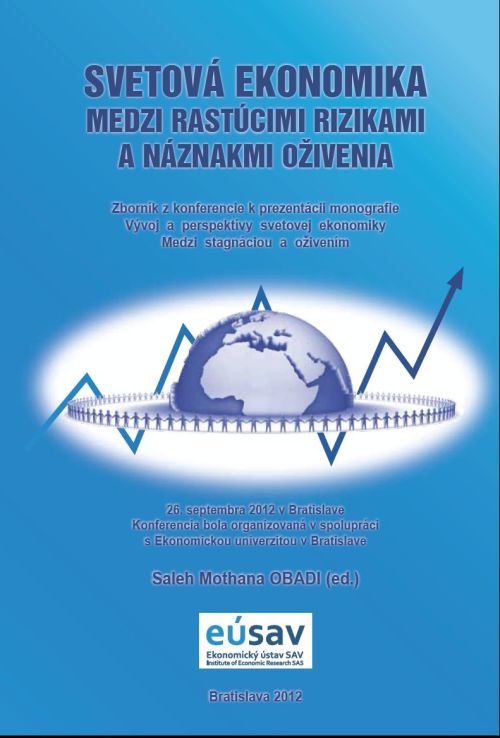Publications - Conference Proceedings
The global economy in between the growing risks and recovery assessments
prof. Ing. Saleh Mothana Obadi, PhD.
Team
Ing. Jaroslav Vokoun, Ing. Ivana Šikulová, PhD., prof. Ing. Peter Staněk, CSc., Ing. Matej Korček, PhD., Ing. Veronika Hvozdíková, PhD., Ing. Boris Hošoff, PhD., Ing. Gabriela Dováľová, PhD., Ing. Tatiana Bujňáková, PhD., Ing. Daneš Brzica, PhD.
- Year: 2012
- Pages: 162
- ISBN 978-80-7144-203-5
 Download file (1,29 MB)
Download file (1,29 MB)
Turbulence of the world economy, which in recent years has been accompanied by a more recent phenomenon, that in sufficient intensity continues today. A persistent crisis has revealed a series of structural, economic, institutional and other shortcomings at both national, regional and global level. The debt crisis in Europe, for example, is only a consequence of long-term accumulated global problems which culminated to international economic crisis in 2008 - 2009. The main issue to be seen throughout the global financial system, which allows individual economies excessively on debt and deficits are managed under the pretext of "achieving rapid economic growth" . It should be here noted that the problem of public debt is not only of Europe but also the problem of the United States and Japan, which have even more debted relative to their GDP, but each of these giant economies uses its advantages resulting from the international financial system and position in international economy, although it may not be for them to benefit indefinitely.
The global economy is between increasing the risks and signs of recovery. In the last three quarters of the year 2012 a number of risks, financial, economic and others were on the rise, especially in the ongoing Eurozone debt crisis and its negative impact not only on other economies of the European Union but also for many regions of the world that are with it highly interconnected through foreign trade. However, signs of fragile recovery can be registered in some industrialized countries and almost complete recovery in emerging and developing countries. This positive signal depends on the further development of the world economy, particularly in the euro area economy.
The world economy in its further development will face many challenges. The first is the consolidation of public finances in many key economies, but particularly in the peripheral countries of the euro area. The second challenge for the global economy is to reduce the unemployment rate, which is partly due to the international economic crisis. Job creation remains one of the main tasks of the Government at present. The solution to this problem is an increase in private consumption, increase production, increase savings and investment and increase economic growth, which ultimately leads to an increased standard of living. Another challenge that affects all countries, but especially in emerging and developing countries, to cope with the high prices of primary commodities and to dampen inflationary pressures arising therefrom.
The present proceeding includes numerous valuable scientific contributions, part of which was presented at the conference for the presentation of scientific monograph "The development and prospects for the world economy: between stagnation and recovery" and other papers representing a crucial complement of the above mentioned monograph and completing element to the problems of the world economy. We hope that this material will contribute to the enhancement of economic literature and provide valuable information to the reader.
Menu
- All
- Monographs and Scientific Edited Books
- Conference Proceedings
- Research Papers IER SAS online
- Expert Papers IER SAS online
- Working Papers IER SAS online
- Policy Brief IER SAS online
- Others online
Contact
Sancova 56
Bratislava 811 05
Tel.: +421-2-5249 8214
eusav.director@savba.sk Slovenská akadémia vied Stratégia ľudských zdrojov pre výskumníkov (HRS4R)


